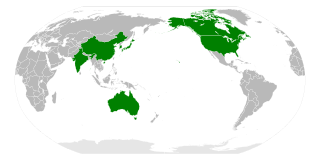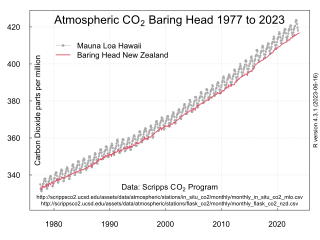Prime Ministerial Task Group on Emissions Trading was a Task Group set up on 10 December 2006 by Australian Prime Minister John Howard to develop an Australian Carbon Trading Scheme. [1] The terms of reference of the task group was:
The Prime Ministerial Task Group submitted its final report on 31 May 2007. The scheme proposed by the Task Group had some similarities to the "hybrid scheme" developed by Warwick McKibbin.
Prime Minister John Howard announced on 4 June 2007 the government's plan for a carbon trading scheme to be launched in 2012. [2] [3] Howard took the draft carbon trading scheme to the 2007 federal election.
Australian state and territory governments, through the Council for the Australian Federation (CAF) in January 2004 set up a working group to investigate the design of a national emissions trading scheme (NETS). This working group became the National Emissions Trading Taskforce (NETT). [4] NETT reported progress to CAF in December 2004, including the development of 10 key design propositions as a basis for further investigation and analysis of a NETS. After extensive consultations, on 28 August 2006 NETT published its final report. [5] On 9 February 2007 CAF declared:
On 30 April 2007, the federal Labor Opposition and the Labor-controlled state and territory governments commissioned the separate Garnaut Climate Change Review.
The Task Group members included:

The Kyoto Protocol (Japanese: 京都議定書, Hepburn: Kyōto Giteisho) was an international treaty which extended the 1992 United Nations Framework Convention on Climate Change (UNFCCC) that commits state parties to reduce greenhouse gas emissions, based on the scientific consensus that global warming is occurring and that human-made CO2 emissions are driving it. The Kyoto Protocol was adopted in Kyoto, Japan, on 11 December 1997 and entered into force on 16 February 2005. There were 192 parties (Canada withdrew from the protocol, effective December 2012) to the Protocol in 2020.

The Asia-Pacific Partnership on Clean Development and Climate, also known as APP, was an international, voluntary, public-private partnership among Australia, Canada, India, Japan, the People's Republic of China, South Korea, and the United States announced July 28, 2005 at an Association of South East Asian Nations (ASEAN) Regional Forum meeting and launched on January 12, 2006, at the Partnership's inaugural Ministerial meeting in Sydney. As of 5 April 2011, the Partnership formally concluded although a number of individual projects continue. The conclusion of the APP and cancellation of many of its projects attracted almost no media comment.
"Greenhouse Mafia" is the title of a TV program aired by Australian network ABC on the 13 February 2006 episode of its weekly current affairs program Four Corners. The program says the term greenhouse mafia is the "in house" name used by Australia’s carbon lobby for itself. The program featured former Liberal Party member Guy Pearse and Four Corners host Janine Cohen, while others concerned about the influence exerted by the fossil fuel lobby also participated. The report was based on a thesis Pearse wrote at the Australian National University between 1999 and 2005 regarding the response of Australian business to global warming. According to the program, lobby groups representing the coal, car, oil, and aluminium industries have wielded their power to prevent Australia from reducing its greenhouse gas emissions, which were already among the highest per capita in the world in 1990.

The energy policy of Australia is subject to the regulatory and fiscal influence of all three levels of government in Australia, although only the State and Federal levels determine policy for primary industries such as coal. Federal policies for energy in Australia continue to support the coal mining and natural gas industries through subsidies for fossil fuel use and production. Australia is the 10th most coal-dependent country in the world. Coal and natural gas, along with oil-based products, are currently the primary sources of Australian energy usage and the coal industry produces over 30% of Australia's total greenhouse gas emissions. In 2018 Australia was the 8th highest emitter of greenhouse gases per capita in the world.

Carbon pricing is a method for nations to address climate change. The cost is applied to greenhouse gas emissions in order to encourage polluters to reduce the combustion of coal, oil and gas – the main driver of climate change. The method is widely agreed and considered to be efficient. Carbon pricing seeks to address the economic problem that emissions of CO2 and other greenhouse gases (GHG) are a negative externality – a detrimental product that is not charged for by any market.

The Carbon Pollution Reduction Scheme was a cap-and-trade emissions trading scheme for anthropogenic greenhouse gases proposed by the Rudd government, as part of its climate change policy, which had been due to commence in Australia in 2010. It marked a major change in the energy policy of Australia. The policy began to be formulated in April 2007, when the federal Labor Party was in Opposition and the six Labor-controlled states commissioned an independent review on energy policy, the Garnaut Climate Change Review, which published a number of reports. After Labor won the 2007 federal election and formed government, it published a Green Paper on climate change for discussion and comment. The Federal Treasury then modelled some of the financial and economic impacts of the proposed CPRS scheme.
Guy Pearse is an Australian author and former Research Fellow at the Global Change Institute at the University of Queensland. His first book titled High & Dry: John Howard, climate change and the selling of Australia's future was published in 2007. In 2009, Pearse published a critique of the Rudd government's response to climate change in Quarterly Essay 33: Quarry Vision: Coal, Climate Change and the End of the Resources Boom. In 2012, he published Greenwash: Big Brands and Carbon Scams – an analysis of whether the climate-friendly revolution being advertised by large multinationals is real.

The Minister for Climate Change and Energy is a portfolio in the Government of Australia. The current Minister is Chris Bowen. The minister administers his or her portfolios through the Department of Climate Change, Energy, the Environment and Water.

Professor Ross Garnaut led two climate change reviews, the first commencing in 2007 and the second in 2010.
The Australian Aluminium Council is an Australian industry association representing companies involved in bauxite mining and the refining, production and distribution of aluminium.

Carbon emission trading (also called emission trading scheme (ETS) or cap and trade) is a type of emission trading scheme designed for carbon dioxide (CO2) and other greenhouse gases (GHG). It is a form of carbon pricing. Its purpose is to limit climate change by creating a market with limited allowances for emissions. This can lower competitiveness of fossil fuels and accelerate investments into low carbon sources of energy such as wind power and photovoltaics. Fossil fuels are the main driver for climate change. They account for 89% of all CO2 emissions and 68% of all GHG emissions.

Climate change in New Zealand involves historical, current and future changes in the climate of New Zealand; and New Zealand's contribution and response to global climate change. Summers are becoming longer and hotter, and some glaciers have melted completely and others have shrunk. In 2021, the Ministry for the Environment estimated that New Zealand's gross emissions were 0.17% of the world's total gross greenhouse gas emissions. However, on a per capita basis, New Zealand is a significant emitter, the sixth highest within the Annex I countries, whereas on absolute gross emissions New Zealand is ranked as the 24th highest emitter.

Greenhouse gas emissions by Australia totalled 533 million tonnes CO2-equivalent based on greenhouse gas national inventory report data for 2019; representing per capita CO2e emissions of 21 tons, three times the global average. Coal was responsible for 30% of emissions. The national Greenhouse Gas Inventory estimates for the year to March 2021 were 494.2 million tonnes, which is 27.8 million tonnes, or 5.3%, lower than the previous year. It is 20.8% lower than in 2005. According to the government, the result reflects the decrease in transport emissions due to COVID-19 pandemic restrictions, reduced fugitive emissions, and reductions in emissions from electricity; however, there were increased greenhouse gas emissions from the land and agriculture sectors.
The Kyoto Protocol was an international treaty which extended the 1992 United Nations Framework Convention on Climate Change. A number of governments across the world took a variety of actions.

The Clean Energy Act 2011 was an Act of the Australian Parliament, the main Act in a package of legislation that established an Australian emissions trading scheme (ETS), to be preceded by a three-year period of fixed carbon pricing in Australia designed to reduce carbon dioxide emissions as part of efforts to combat global warming.
A carbon pricing scheme in Australia was introduced by the Gillard Labor minority government in 2011 as the Clean Energy Act 2011 which came into effect on 1 July 2012. Emissions from companies subject to the scheme dropped 7% upon its introduction. As a result of being in place for such a short time, and because the then Opposition leader Tony Abbott indicated he intended to repeal "the carbon tax", regulated organizations responded rather weakly, with very few investments in emissions reductions being made. The scheme was repealed on 17 July 2014, backdated to 1 July 2014. In its place the Abbott government set up the Emission Reduction Fund in December 2014. Emissions thereafter resumed their growth evident before the tax.

The Climate Change Authority (CCA) is an Australian Government statutory agency responsible for providing independent advice to government on climate change policy. It was established by and operates under the Climate Change Authority Act 2011. The Authority commenced operations on 1 July 2012. It was setup by Julia Gillard and has withstood concerted efforts for its disestablishment. The Abbott government campaigned for the CCA's abolishment, having successfully abolished the Climate Commission.

The United Nations Climate Change Conference, COP19 or CMP9 was held in Warsaw, Poland from 11 to 23 November 2013. This is the 19th yearly session of the Conference of the Parties to the 1992 United Nations Framework Convention on Climate Change (UNFCCC) and the 9th session of the Meeting of the Parties to the 1997 Kyoto Protocol. The conference delegates continue the negotiations towards a global climate agreement. UNFCCC's Executive Secretary Christiana Figueres and Poland's Minister of the Environment Marcin Korolec led the negotiations.
The history of climate change policy and politics refers to the continuing history of political actions, policies, trends, controversies and activist efforts as they pertain to the issue of global warming and other environmental anomalies. Dryzek, Norgaard, and Schlosberg suggest that critical reflection on the history of climate policy is necessary because it provides 'ways to think about one of the most difficult issues we human beings have brought upon ourselves in our short life on the planet'.